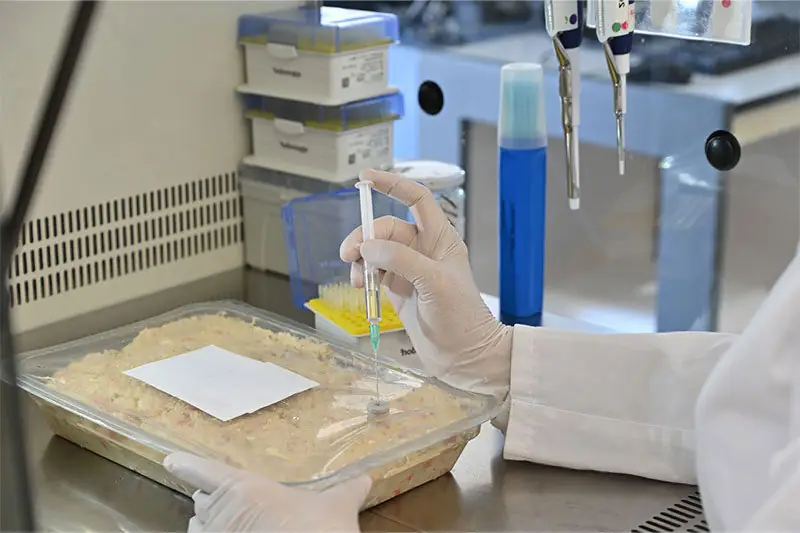ISO 18415 Detection of Microbial Contamination in Cosmetics Testing
The ISO 18415 standard is a critical benchmark for ensuring microbiological safety in cosmetics. This service focuses on the rigorous detection and quantification of microbial contamination in cosmetic products to uphold consumer health and safety standards. The process involves several steps, including sample collection, preliminary incubation, enrichment broth culture, plating on appropriate media, and identification of microorganisms using biochemical tests.
The standard specifies a comprehensive approach to microbiological testing that includes the enumeration of total viable counts (TVC), aerobic plate count (APC), and the detection of specific pathogens. The TVC provides an initial assessment of microbial activity in the sample, while APC helps identify potential spoilage organisms. Detection of specific pathogens is essential for identifying health risks associated with certain microorganisms.
The ISO 18415 method ensures that laboratories use validated media and reagents to achieve accurate results. This includes the use of tryptone soya broth (TSB) for enrichment, agar-based plating media such as Violet Red Bile Agar (VRBA), and other specialized media depending on the suspected pathogen. Identification of isolated colonies is conducted using standard biochemical tests and sometimes molecular diagnostics.
The process also involves stringent quality control measures to ensure reliability. This includes regular calibration of equipment, validation of methods, and participation in proficiency testing programs. Compliance with ISO 18415 ensures that laboratories maintain high-quality standards throughout the testing process.
Customer satisfaction is paramount in this service. By adhering strictly to ISO 18415 guidelines, we ensure accurate and reliable results, which are crucial for maintaining product quality and ensuring compliance with international regulations. This standard is widely recognized and accepted globally, making it a preferred choice for manufacturers aiming to meet stringent safety standards.
Industry Applications
| Industry Segment | Application Description |
|---|---|
| Cosmetics and Personal Care | Detection of microbial contamination to ensure product safety and compliance with international regulations. |
| BioPharmaceuticals | Monitoring the microbiological quality of raw materials and finished products. |
| Food and Beverage | Ensuring that packaging lines and equipment are free from microbial contamination. |
| Environmental Monitoring | Detecting environmental samples to determine the presence of hazardous microorganisms. |
The ISO 18415 standard is not limited to just one industry but finds application across various sectors. In cosmetics and personal care, it ensures that products are safe for consumers by identifying potential health risks associated with microbial contamination. In bio-pharmaceuticals, the standard helps in maintaining product integrity and safety during production processes. For food and beverage companies, ISO 18415 aids in ensuring hygiene standards at every stage of production.
Environmental monitoring also benefits from this standard by providing reliable data on the presence of hazardous microorganisms in the environment. By adhering to these stringent guidelines, industries can ensure that their products meet the highest safety and quality standards, thereby building consumer trust and confidence.
Customer Impact and Satisfaction
The implementation of ISO 18415 in cosmetic testing significantly impacts customer satisfaction by ensuring product safety and compliance with international regulations. This standard not only protects consumers from potential health risks but also enhances brand reputation and trust.
Cosmetic manufacturers who adhere to this standard can rest assured that their products meet the highest quality standards, thereby reducing the risk of recalls or product withdrawals due to microbial contamination. For regulatory bodies, ISO 18415 provides a robust framework for ensuring compliance with international regulations, which is essential for maintaining consumer trust and confidence.
In addition to these benefits, adherence to this standard also contributes to environmental sustainability by minimizing the use of resources and reducing waste in production processes. This aligns with global efforts towards sustainable development, making ISO 18415 a preferred choice for responsible manufacturers.
Our commitment to delivering accurate and reliable results has earned us a reputation for excellence among our customers. By partnering with us, you can be assured of consistent quality and compliance with the latest standards in microbiological testing. This ensures that your products meet the highest safety and quality standards, thereby building consumer trust and confidence.
Use Cases and Application Examples
The ISO 18415 standard is widely used across various industries to ensure product safety and compliance with international regulations. One of its key applications is in the cosmetics sector, where it is essential for detecting microbial contamination in products.
A leading cosmetic manufacturer uses this service to test raw materials and finished products for microbial contamination. By adhering to ISO 18415 guidelines, they ensure that their products meet the highest safety standards and comply with international regulations. This has helped them maintain a strong brand reputation and consumer trust.
An example of how ISO 18415 is used in practice involves a pharmaceutical company conducting microbiological testing on raw materials before processing. By following this standard, they can ensure that their products are free from microbial contamination, thereby reducing the risk of product recalls or withdrawals.
In another instance, an environmental monitoring agency uses this service to detect hazardous microorganisms in water samples. This helps them maintain public health standards and ensures compliance with international regulations.
The versatility and reliability of ISO 18415 make it a preferred choice for various industries looking to ensure product safety and compliance with international regulations. By adhering to these stringent guidelines, manufacturers can build consumer trust and confidence while maintaining their brand reputation.





